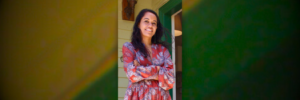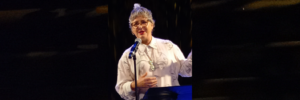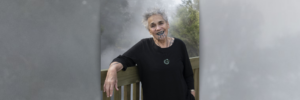
Photo credit: Trinity Thompson-Browne
Nicole Titihuia Hawkins (Ngāti Kahungunu ki Te Wairoa, Ngāti Pāhauwera) is a writer, teacher, red lipstick enthusiast and proud māmā. She lives in Te Awakairangi and runs side hustles with her besties in her spare time. Her collection, Whai, won the Jessie Mackay Prize for best first book of Poetry at the 2022 Ockham New Zealand Book Awards.
Kia ora Nicole! Can you give us an insight into the tikanga or customs of your writing process?
I don’t have rigid tikanga around my writing, other than when the kupu come, let it flow – wherever you are. I actually have to really work on being more disciplined in my writing, and maybe establishing more writing tikanga would help. I love food, so often I’ll write with great snacks, unless I’m writing about a kaupapa that feels heavy, then I save my kai for after.
Whai has a really unique structure – can you tell us about the seven sections of the book and what inspired you to structure the collection in this way?
I structured Whai like a Kapa Haka bracket, because I found I had poems that were quite heavy on emotive language (some may say cliche), which isn’t favoured in English writing usually. In te ao Māori we have space for writing with heavy emotions, like waiata tawhito. I wanted to make space for myself to write what I needed to write and have that be valid. I have never performed with a Kapa, so in some way this is my contribution to Māori creative expression.
How did it feel to hold Whai in your hands for the very first time?
I thought I would be way more in my feels than I was, but maybe I was in shock! I thought a lot about how it would feel, especially in the editing process and then when it happened it was like seeing an old friend for the first time in ages.
So you’re a full-time writer, māmā and run an earring business on the side!? (@taonga_puawai) How do you balance it all? What advice would you give to writers who are also juggling multiple plates?
I think you have to have a really great team. My business partner, whānau and friends make it possible for me to do what I do and I’m really thankful for them.
I don’t think I’m doing a particularly good job at the juggle game, but so long as my pēpi is happy, I have to be kind to myself when other things don’t go as well. Something always has to give, most of the time in our whare it’s the maunga teitei of washing, or my own writing time. I often think of Alice Te Punga Somerville’s poem An Indigenous woman scholar’s prayer, “may I lie on a future death-bed and look back with regrets related to work rather than regrets related to family”. That line is forever ringing in my ears and I know in the stage I’m in now with my piri pāua pēpi, that it won’t last forever. Also I think it’s important to know that you can totally do it all if you want to, get – but you don’t bloody have to! Just existing in this wild world is enough! Take your time and enjoy one thing at a time if you can. That may sound really idealistic because I know for so many creatives and parents that doing one thing is just not financially possible in this day and age. Kia kaha koutou!
How do you think your mokopuna will feel about your book? What do you hope their reactions will be?
I hope that they feel proud but most of all I hope they can’t relate to some of the poems because they live in a world where they stand more firmly in their understanding of their whakapapa.
Now that Whai is out in the world, what’s next on the agenda? Tell us a bit about your upcoming projects and dreams for the future.
I’m just about ready to start writing my next collection. At this stage it will be about this phase of my life as a māmā, birth trauma, racism and fatphobia in the medical system and postnatal depression. Ya know, all the light and fluffy colonisation stuff.
You’re such a natural at reaching out and connecting with Māori writers as the Trust’s editor. What advice would you give to others who are looking to build relationships within the Māori writing community?
Showing up for others and for the kaupapa is a great start to building relationships in the Māori writing community. Even if you’ve never met them, show up to performances, book launches and gigs to support kaituhi Māori. Hopefully when it’s your turn, they’ll show up for you too. I’ve been to mainstream readings in the past where writers have said to me afterwards, “thanks for coming. It meant so much to have another Māori in the room”. When you’re invited to read, it’s a great idea to hold the stage door open for others. Try and get in the habit of asking which other Māori writers are going to be invited and make suggestions if the organisers need to broaden their networks. If you have to turn down mahi, let them know of other Māori writers who would be good for the job, especially emerging writers and kaituhi with multiple intersections.
Lastly, what key advice would you give to emerging Māori writers?
Keep writing. There is so much healing in your kupu. Your stories need to be written, and the world needs those taonga.




